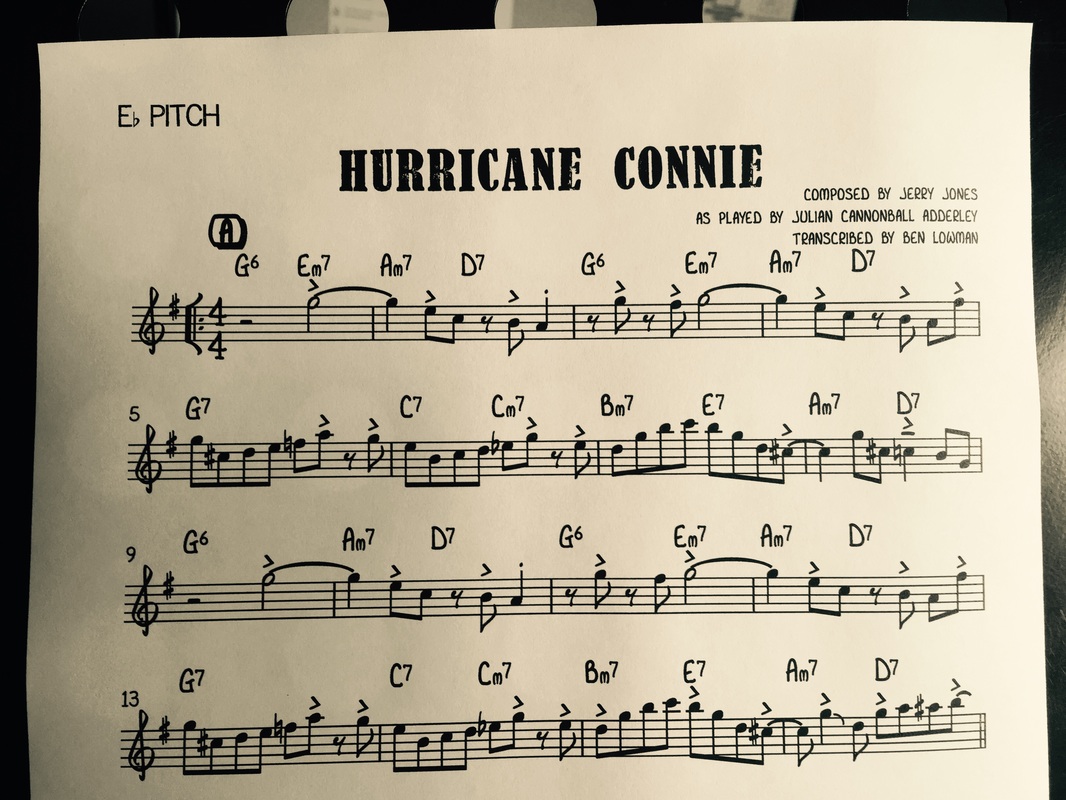Discover.Welcome back! Next week I have a performance coming up playing exclusively Cannonball Adderley repertoire, As a result, I've been back listen to the man himself, specifically the album mentioned in post 2, 'Julian 'Cannonball' Adderley.' The tune I have gravitated toward this week is called 'Hurricane Connie.' This track isn't on YouTube, similar to 'rose room' though you can buy 12 classic Cannonball albums for £3.49 from iTunes,(follow the link). The 12 classic albums includes the song 'rose room,' among many others - It's thoroughly worth investing in! The tune 'Hurricane Connie,' is based upon a song form & progression called 'rhythm changes.' This is form and chord progression was composed from a song called 'I got rhythm,' in 1930 by George Gershwin. Click the link to see a restored video of him playing from 1931. The amazing thing is that this chord progression and form (AABA) is still be still being used to play and compose over today! Interesting facts...A 'rhythm changes' is a very common chord progression and form (AABA), used time and time again to compose melodies over. Over time musicians have composed new 'heads' (jazz terminology for melodies) over this existing form as well as developing the harmony. If you don't understand form like AABA or chord progressions, don't worry, I'll be covering some in upcoming posts! Back in post 2, I mentioned writing 'contrafacts,' composing a new melody over a pre-determined chord sequence. Why is the this useful to know/ relevant? Well, a couple of reasons: 1. Once you've learnt a rhythm changes chord progression & have practised soloing, you can use jazz language/ patterns, shapes etc for improvising on a number of various songs! Helping to make your improvising skills instantly adaptable to a new song.- hoorah! 2. You are able to play other 'heads,' in your solos whilst playing a different song! This is called 'quoting,' and happens frequently when some jazz musicians improvise. A master of this was Phil Woods. find out more about him on his website. A quick warning. You need to be slightly wary whilst quoting other heads over different rhythm changes chord progressions. This is because sometimes the chord types in the progression vary slightly. This can be enough to make some heads not sound quite right over other rhythm changes progressions. This is the case with parts of 'Hurricane Connie,' but this is something I'll cover in more detail at a later date. My advice would be, If you can, use a combination of theory & your ears to work out/hear if it is going to sound good. If theory isn't a strong point, just use your ears! Ultimately - if it sounds bad or not quite right - don't use that particular head, pick a different one to quote instead! Learn.Here are the parts for 'Hurricane Connie.'
More rhythm changes heads... Here are a few songs which are written over the rhythm changes form.
The list goes on - If you know any other heads, it'd be great to know of them, so post them in the comments below! Playalong. I've included a play-along for practising improvising 'Hurricane Connie.' Again, It's only midi - but still serves it's purpose. You have 3 speeds to choose from, start slow and ensure that you're getting the correct phrasing. Ideally, buy the track and then play along with it slowed down! Remember, getting the notes and rhythm correct is only half the job, which hopefully my parts will make easier. Remember, whilst you play along to the recording/ midi you need to get all the nuances. For example bends, vibrato, accents etc. There's no shame in replicating - it's the highest form of flattery and will continue to help you 'pay your dues.'
Anyhow, until next time, keep practising & listening. All the best and catch you soon. Thanks, Ben. P.s. If this is helpful/useful or you have any questions/suggestions/ requests please comment below or even get in touch via my email. Again, good luck & until next time good luck!
0 Comments
|
Discover | Learn | Play.Welcome to my BLOG. Categories
All
Archives
April 2021
|
||||||||||||||||||||||||


 RSS Feed
RSS Feed
